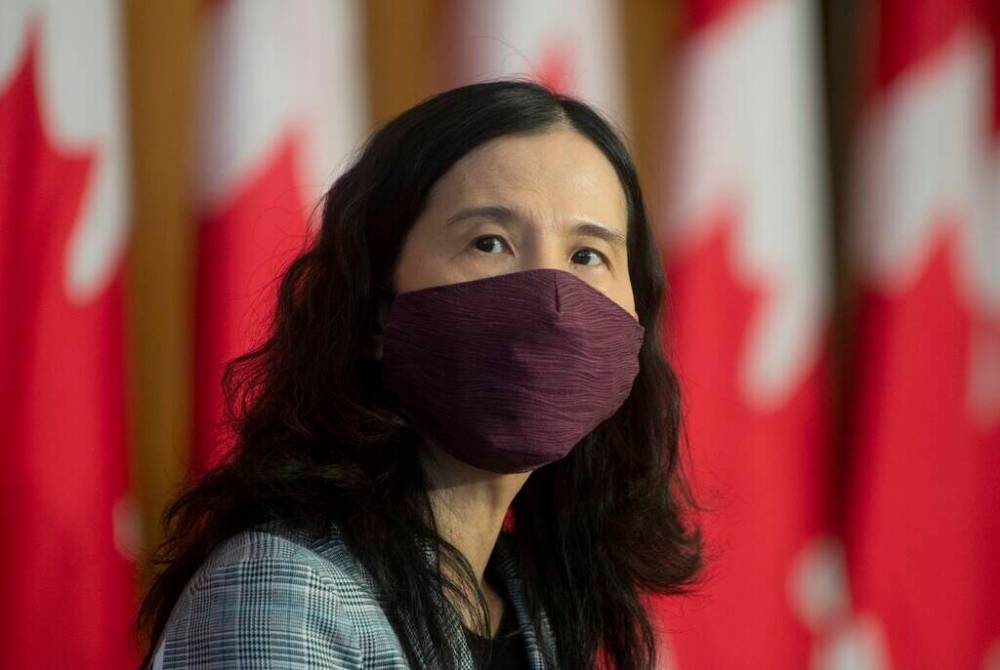Tam preaches cohesion as Canada enters sixth wave
Advertisement
Read this article for free:
or
Already have an account? Log in here »
To continue reading, please subscribe:
Monthly Digital Subscription
$0 for the first 4 weeks*
- Enjoy unlimited reading on winnipegfreepress.com
- Read the E-Edition, our digital replica newspaper
- Access News Break, our award-winning app
- Play interactive puzzles
*No charge for 4 weeks then price increases to the regular rate of $19.00 plus GST every four weeks. Offer available to new and qualified returning subscribers only. Cancel any time.
Monthly Digital Subscription
$4.75/week*
- Enjoy unlimited reading on winnipegfreepress.com
- Read the E-Edition, our digital replica newspaper
- Access News Break, our award-winning app
- Play interactive puzzles
*Billed as $19 plus GST every four weeks. Cancel any time.
To continue reading, please subscribe:
Add Free Press access to your Brandon Sun subscription for only an additional
$1 for the first 4 weeks*
*Your next subscription payment will increase by $1.00 and you will be charged $16.99 plus GST for four weeks. After four weeks, your payment will increase to $23.99 plus GST every four weeks.
Read unlimited articles for free today:
or
Already have an account? Log in here »
Hey there, time traveller!
This article was published 12/04/2022 (1329 days ago), so information in it may no longer be current.
OTTAWA — Canada’s top doctor says obliging Canadians to cover their face could hurt social cohesion, even if mask mandates remove the “guess work” of gauging one’s risk of catching COVID-19.
“Different communities — not just at the provincial level, but the local level — know their community the most, and what can… bring people in a cohesive way instead of a divisive way,” Dr. Theresa Tam said Tuesday.
“We can’t have too many ‘them and us.’ It’s about working together.”

The chief public health officer was holding a recurring COVID-19 update and confirmed Canada is effectively in a sixth wave, with some regions already at that point and case rates elsewhere heading toward that situation.
Epidemiologists generally qualify a COVID-19 wave as when cases grow at an exponential rate for more than a week.
Tam said a rise in cases was always expected as jurisdictions rolled back public health restrictions and the more contagious subvariant of Omicron (such as BA.2) took hold. However, she was concerned about an increase in severe cases.
Hospitalizations are starting to increase, but Tam is hopeful vaccine coverage will prevent pressure on intensive care wards, which would take a few weeks to occur.
“We’re transitioning from what I would hope is the acute, crisis phase, into the sort of somewhat unknown, uncertain territory of viral evolution,” said Tam.
She urged Canadians to get vaccinated, wear a mask and avoid crowded environments — regardless of what provincial rules say.
“It sometimes takes the guess work out of people, I think on a practical basis, if there is a mandate. But I think all public health authorities at the moment are trying to shift the paradigm, into making sure people learn these good habits and be able to employ them,” Tam said.
“Giving people the data and the information to add the layers of protection is important.”
Manitoba and most provinces have rolled back mask requirements, and asked the public to gauge their risk while reporting less data than at any point in the pandemic.
Tam said provinces are ramping up PCR test from a low last seen in summer 2020, and a more representative sample than the current criteria could show community spread.
She also said wastewater data is becoming increasingly helpful. (In Winnipeg that data is published with a two-week lag.)
Tam said doctors have discussed other innovations, such as following the Northwest Territories in requiring people to report the results of their rapid tests online or by phone.
Meanwhile, disability advocates have argued making masks optional has put the burden on vulnerable people to avoid unsafe spaces, instead of having all of society face a minor inconvenience.
Tam responded to that viewpoint by saying governments can always reimpose mask mandates if the situation changes, such as the emergence of a new variant. “To observe the impacts of requirements versus recommendations is very important.”
She also urged the public not to chide people who choose to keep wearing a mask.
“At this moment in time, it is very important for us not to divide the population, and (to) keep messaging the need to protect each other,” said Tam.
“Everybody needs to be heard, but I think from a public health perspective, it is clear that the vaccines are effective. And you should get boostered; you should wear a mask.”
dylan.robertson@freepress.mb.ca

